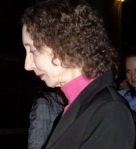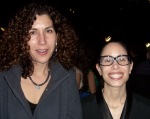As Dr. Jessica Burstein of the UW English Dept, introduces Joyce Carol Oates, the room grows still. Surely the credits are remarkable and even perhaps incomparable—over 50 novels and dozens of short story collections, the National Book Award and the PEN/Malamud Award for Excellence in Short Fiction. Her works Black Water, What I Lived For, and Blonde were all finalists for the Pulitzer Prize. In 2003, Oates was honored with the Common Wealth Award for Distinguished Service in Literature. For brevity, here I omit listing her purview at Princeton and other extensive recognitions…
Joyce Carol Oates’ quiet presence filled the room as Seattle’s Benaroya Hall audience sat in on a discussion of Oates work, skillfully and unobtrusively led by Dr. Burstein. But for starters, Oates took off the mantle of her achievements, making it clear that her role was not to distribute wisdom, rather it seems she casts sidelong glances at her worldly accomplishments, not owning them in a way that explains her light touch in discussing her writing process and the consistently unusual choice of topic for her works.
Oates recent memoir A Widow’s Story figured prominently in the discussion. Here with us, she describes the grieving process as a cyclical and wearing illness—a convalescence during which one is not quite their normal self. She discusses the odd kind of displacement, noting that the flip side of not feeling at home, is that anyplace can seem to be home—a kind of odd existentialism emerging from loss. Akin to the aftermath of 9/11 for New Yorkers, words sometimes can seem inadequate and there is a kind of primitive superstition.
Oates finds the construct of the memoir to be the most seductive of the literary genre, at least in part, due to its accessibility, and that it is “true to the rawness of the immediate experience before it is named.” With a wonderful humorous irony, Oates discusses how her cats once soiled her husband’s death certificate and the bizarre state of having the everyday rub up against life changing events. Rather than opt for drama, in real life, the grieving Oates, picked up her husband’s work and completed his projects, editing and being sure authors were paid.
In accounting for her choices in writing Oates explains that in her view tragedy is the highest form of art…tragedy begins with a flawed human, who is put to the test and then becomes emblematic. Shakespeare’s works are great works because they take us on a journey, which is allegorical, but could also have been human. King Lear is an example of this, as are also Macbeth and Hamlet.
Asked about Gothic writing, Oates says “[the] Gothic is a history with a capitol ‘G’” giving one the opportunity to write about things in a psychological way. Her works concerning boxing came from her exposure as a child to the boxing ring and the spectacle of it all, but mostly “the human sorrow near the edge of the ring, where blood flies.” Oates notes that men tend to write about the top of this pyramid, focused on the few champions. Her interest is with the much larger numbers of gifted individuals near the base of this pyramid, whose stories are poignant, dramatic and visceral. There is a strong identification with the loser. Failure is more universal than success, and is emblematic of humans in general.
Oates’ essay What Sin to me Unknown in The Faith of a Writer: Life, Craft, Art, discusses why writers write, the dream logic and the “niceties of foreign grammar“ alongside childhood fantasies and the diverse musings that lead one down a path. She concludes this essay with a quote from Alexander Pope’s Epistle to Dr. Arbutbnot:
Why did I write? what sin to me unknown
Dipt me in Ink, my Parents’, or my own?
As yet a Child, nor yet a Fool to Fame,
I lis’pd in Numbers, for the Numbers came.*
Asterisk from JCO: *By numbers Pope meant rhythm and rime.
Next up at SAL:
Richard Ford TUE, MAY 10, 2011, 7:30 PM Benaroya Hall S. Mark Taper Foundation Auditorium
Wendell Berry TUE, MAY 24, 2011, 7:30 PM Benaroya Hall S. Mark Taper Foundation Auditorium
Roy Blount, Jr. WED, MAY 25, 2011, 7:30 PM Town Hall Seattle



